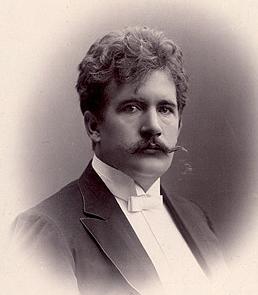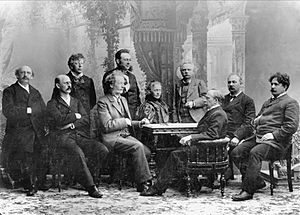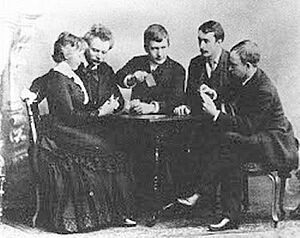Johan Halvorsen facts for kids
Quick facts for kids
Johan Halvorsen
|
|
|---|---|
 |
|
| Background information | |
| Born | 15 March 1864 Drammen, Norway |
| Died | 4 December 1935 (age 71) Oslo, Norway |
| Genres | Classical |
| Occupation(s) | Conductor, pedagogue, violinist |
| Instruments | Violin |
| Associated acts | Oslo-Filharmonien |
Johan Halvorsen (born March 15, 1864 – died December 4, 1935) was a famous Norwegian composer, conductor, and violin player. He wrote many pieces of music and led orchestras.
Contents
A Musician's Life
Johan Halvorsen was born in Drammen, Norway. He was very good at playing the violin from a young age. He became a very important person in Norwegian music.
He studied music in Kristiania (which is now Oslo) and Stockholm. Later, he became a concertmaster in Bergen. A concertmaster is the leader of the first violin section in an orchestra. It's a very important role!
After Bergen, he joined the famous Leipzig Gewandhaus Orchestra. He also worked as a concertmaster in Aberdeen. Then, he became a music professor in Helsinki. He even went back to being a student again in places like St Petersburg, Leipzig, Berlin, and Liège. He learned from great violin teachers like Adolph Brodsky and César Thomson.


In 1893, Halvorsen came back to Norway. He became the conductor for the theatre orchestra at Den Nationale Scene in Bergen. He also led the Bergen Philharmonic Orchestra. He was the concertmaster there in 1885 and became the main conductor in 1893.
In 1899, he got a big job as the conductor of the orchestra at the new National Theatre in Kristiania. He kept this job for 30 years! He retired in 1929.
Besides theatre music, Halvorsen conducted over 30 operas. He also wrote music for more than 30 plays. This special music for plays is called incidental music. After he retired, he had more time to write his own music. He wrote three symphonies and two well-known Norwegian rhapsodies.
Halvorsen's music was similar to the national romantic style of Edvard Grieg. Grieg was another very famous Norwegian composer. Halvorsen even married Grieg's niece! He also helped arrange some of Grieg's piano music for orchestras. For example, he arranged a funeral march that was played at Grieg's funeral.
Some of Halvorsen's most famous pieces today are the Bojarenes inntogsmarsj (which means Entry March of the Boyars) and Bergensiana. He also wrote duos for violin and viola called Passacaglia and Sarabande. These were based on music by George Frideric Handel.
In 2016, something exciting happened! Librarians found the music for his violin concerto. This piece had only been played three times in 1909 and was thought to be lost forever. In 2016, it was played again for the fourth time, 107 years later!
Selected Compositions
Johan Halvorsen wrote many different kinds of music. Here are some of his important works:
Operetta
An operetta is like a short, light opera, often with spoken parts.
- Mod Nordpolen (Toward the North Pole), in 3 acts (1911)
Incidental Music
This is music written to be played during a play.
- Gurre, Op. 17; music for a play by Holger Drachmann
- Reisen til Julestjernen (Journey to the Christmas Star); music for a Christmas play
- The Merchant of Venice; music for the famous Shakespeare play
- Macbeth (1920); music for another Shakespeare play
Orchestra Music
These are pieces written for a full orchestra.
- Bojarenes inntogsmarsj (Entry March of the Boyars) (1895)
- Festovertyre (Norwegian Festival Overture), Op. 16 (1899)
- Bergensiana, Rococo Variations on an Old Melody from Bergen (1913)
- Norske rapsodie No. 1 (Norwegian Rhapsody No. 1) (1919–1920)
- Norske rapsodie No. 2 (Norwegian Rhapsody No. 2) (1919–1920)
- Symphony No. 1 in C minor (1923)
- Symphony No. 2 "Fatum" in D minor (1924)
- Symphony No. 3 in C major (1929)
- Norske eventyrbylleder (Norwegian Fairy-tale Pictures), Op. 37 (1933)
Concertante Music
These pieces feature a solo instrument, like a violin, playing with an orchestra.
- Air norvégien (Norwegian Air) for violin and orchestra, Op. 7 (1896/1903)
- Concerto in G minor for violin and orchestra, Op. 28 (1909); this is the lost concerto that was found!
Chamber Music
Chamber music is written for a small group of instruments, usually one player per part.
- Passacaglia in G minor on a Theme by George Frideric Handel for violin and viola or cello (1897)
- Sarabande con variazioni in D minor on a Theme by George Frideric Handel for violin and viola or cello (1897)
- String Quartet in E, Op. 10
Choral Music
This music is written for a choir, sometimes with instruments.
- Varde, Cantata for male chorus and orchestra, Op. 11 (1904)

